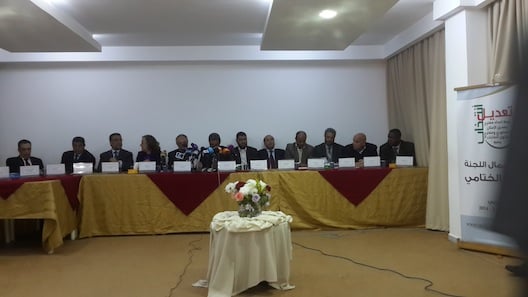By Ahmed Elumami.

Tripoli, 5 March 2014:
An interim successor to the General National Congress should be renamed the . . .[restrict]House of Representatives and be based in Benghazi, the February Committee has proposed.
The committee was commissioned last month by Congress to propose an amendment to the 2011 Constitutional Declaration and a new election law in the event that it decides to dissolve itself and have elections for a new legislature because there is no chance of Libya’s new constitution being drafted before the end of July.
Under the amendment proposed by the committee, Congress would be dissolved once the House of Representatives elections had taken place, Benghazi independent Congressman Ahmed Langhi, a member of the committee, told the Libya Herald. At that point the House would then call for and organise direct elections for a President of Libya.
The amendment has yet to be approved by Congress, Langhi explained after a press conference yesterday attended by all 15 members of the committee.
Speaking at the event, the head of committee, Al-Koni Abboda, stressed that the proposals had been devised by Libyans without any help from outside the country.
Women would be “well represented” in the new legislature, he said, although he did not elaborate as to how this would be achieved.
The House of Representatives’ term of office would last until the new constitution was enacted, he explained. It should not, however, exceed 18 months from the date of the first session of the Constitutional Assembly (expected this month) unless approved in a referendum.
Abboda added that the seat of the House of Representative would be in Benghazi but that it would had the right to meet in a different locations.
At its first meeting, chaired by the oldest member to be elected, a speaker and deputies would be chosen Within four weeks of that meeting, its procedural rules would have had to be approved by an absolute majority of the representatives.
In regards to the state president, the amendment sees him as the embodiment of national unity. His role would be ensure the interests of the people were protected and maintain the country’s independence maintained.
The proposed amendment listed thirteen powers for the state president:
- To represent Libya at international gatherings and events connected to foreign affairs.
- To appoint the Prime Minister and instruct him to form a cabinet;
- To be commander-in-chief;
- To appoint and dismiss the head of intelligence in agreement with the House of Representatives;
- To appoint ambassadors and representatives of Libya to the international organisations at the suggestion of Minister Foreign Affairs;
- To appoint and dismiss senior officials after consulting with the Prime Minister;
- To accept the accreditation of representatives of foreign countries and bodies to Libya;
- To issue laws passed by the House of Representatives;
- To sign international conventions and treaties to be ratified by the House of Representatives;
- To declare of a state of emergency, war and to take extraordinary measures after approval from the Council of Defence and National Security, presenting them to the House of Representatives for approval within a period not exceeding ten days;
- To chair meetings of the Council of Ministers if attending them;
- To dismiss the Prime Minister after consultation with the Speaker of the House of Representatives, and dismis ministers after consultation with the Prime Minister.
- To have other powers as stipulated by the Constitutional Declaration and the law.
In addition, the proposed amendment stated that the president must be a Muslim and a Libyan citizen, and that his parents also be Libyan. The president should not hold a foreign passport and should not be married to a foreign national. He should not be less than 40 years old at the day of the nomination and must publish a full list of his and his family’s possessions both within Libya and abroad.
Candidates for the post of president would have to be nominated by at least 5,000 Libyan citizens.
[/restrict]






